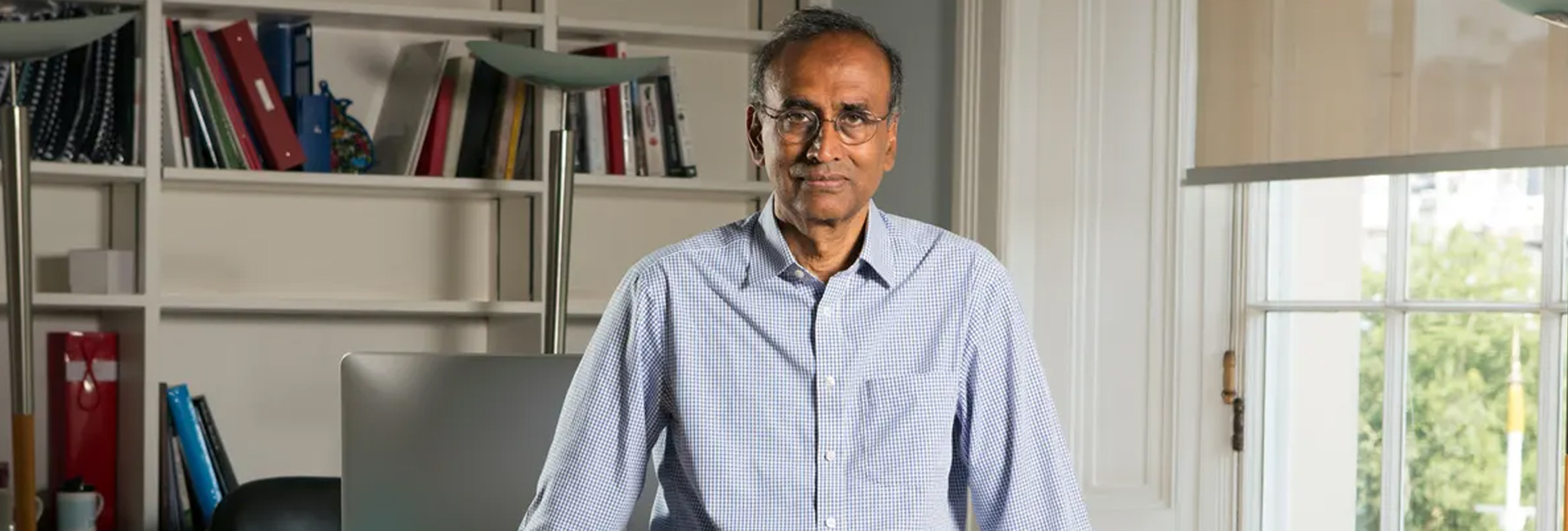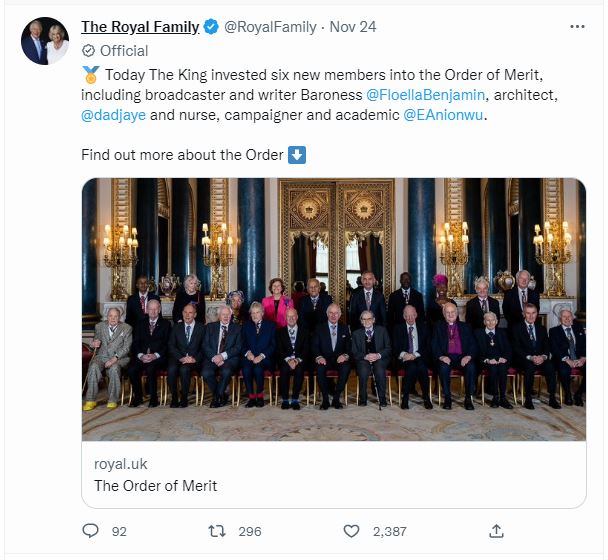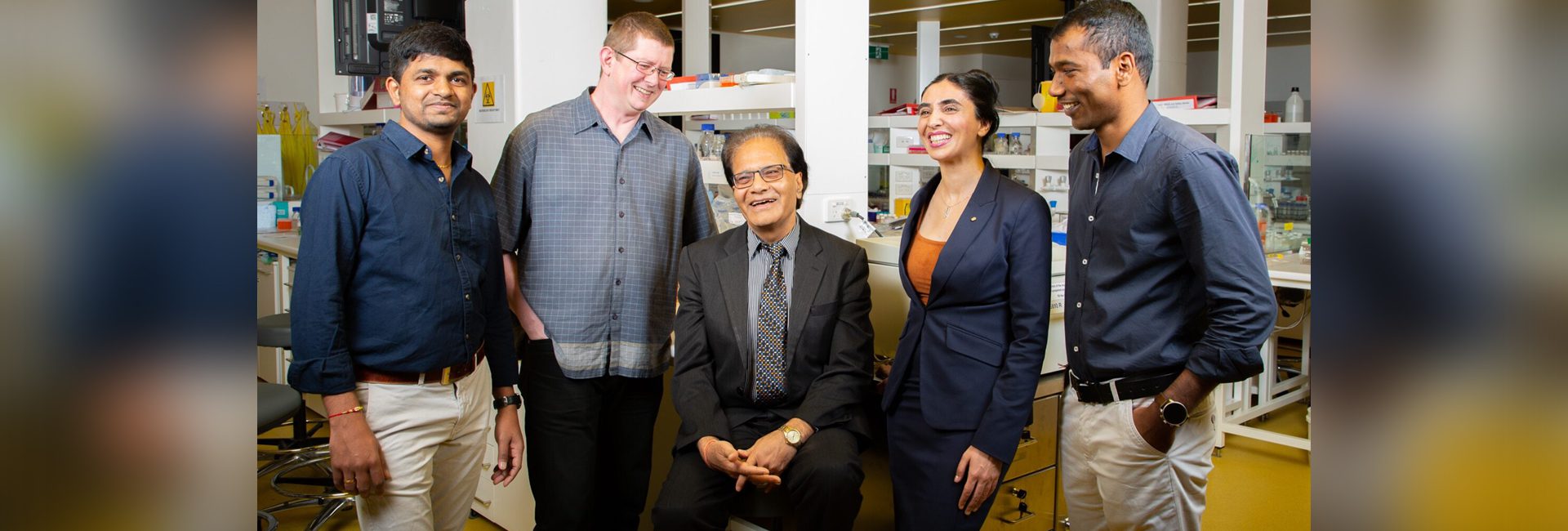(December 1, 2022) King Charles III has appointed six new members to the British Order of Merit. They are the final Officers of the Most Excellent Order of the British Empire (OBEs) chosen by Queen Elizabeth II. Among them is the world-renowned structural biologist and Nobel Laureate Venkatraman Ramakrishnan. Ramakrishnan is also the first Indian to have been elected president of the UK’s Royal Society, the world’s oldest independent scientific academy. Ramakrishnan, who goes by ‘Venki’, believes that people like him are “token representatives of science,” the “lucky ones whose work was recognized,” maintaining that there are “many other brilliant scientists who are doing a great job.”
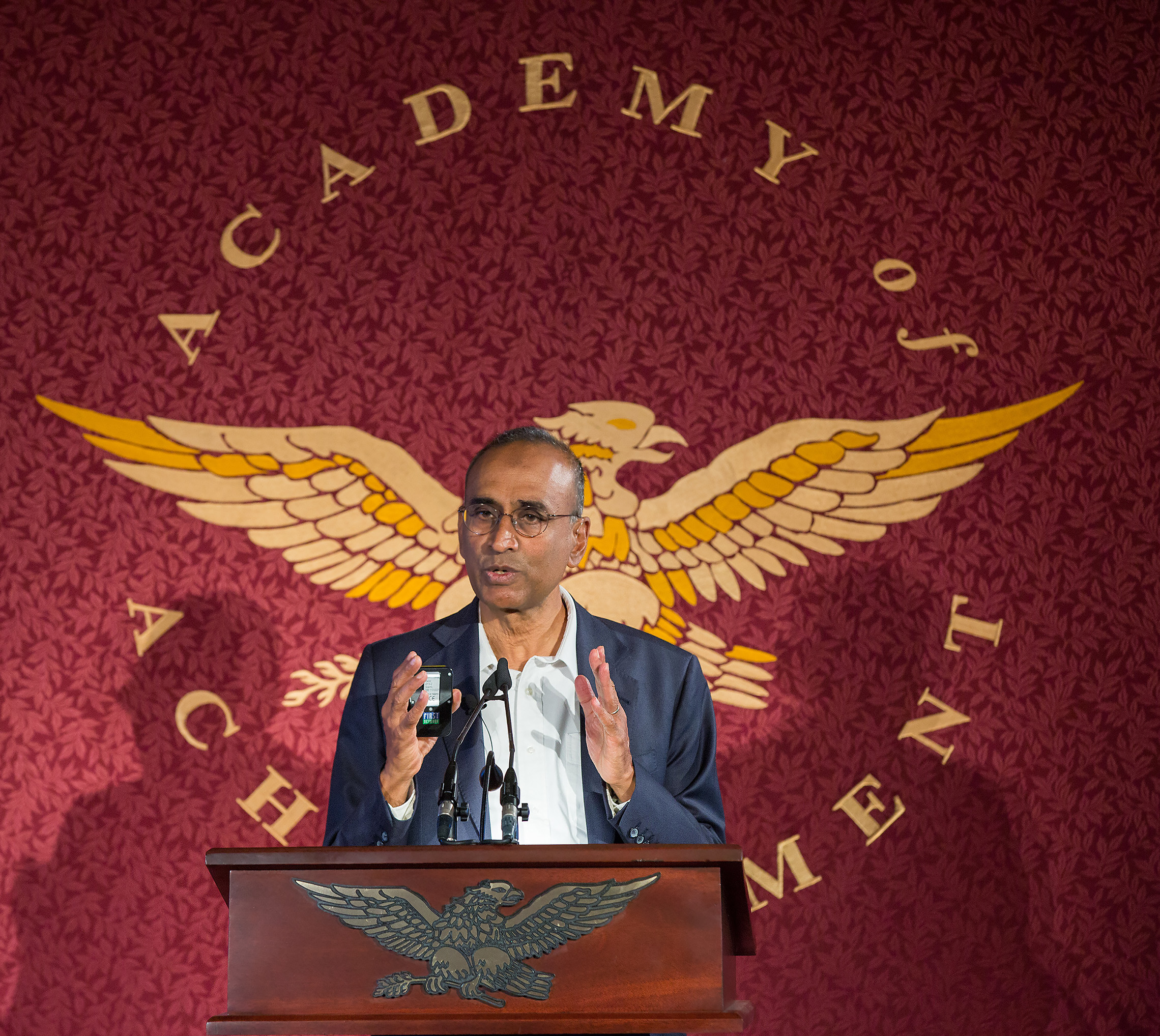
Venkataraman Ramakrishnan | Photo Credit: Academy of Achievement
Talking about the breakthrough work that led him to become a Nobel laureate, the Global Indian remarked in an interview with Academy of Achievement:
Of course I was practising leadership during the entire research work but I could have never done the work by myself. It was a team effort, lots of scientists made significant contributions.
“Science is not a sporting competition”
Ramakrishnan struggled enough during the early years of his career, rising above the odds and eventually winning the Nobel Prize in 2009. The day the prize was announced, Ramakrishnan was in a bad mood – he had had a flat tyre on the way to work, forcing him to walk the rest of the way and arrive late. When the phone rang with the big news, he thought his friends were playing a prank on him.
He shared the laurel with Ada Yonath and Thomas A Steitz for their breakthrough work in the sphere of ribosomes (minute particles within living cells, that perform biological protein synthesis). Their contribution to science opened up new possibilities in the development of antibiotics.

Dr Ramakrishnan receiving Nobel Prize in Chemistry from King Carl XVI Gustaf of Sweden in 2009
Exciting as it is to win the Nobel Prize, Ramakrishnan doesn’t believe that science is a race, where reaching the finishing line first makes a winner. “I’m not a fan of prizes,” Ramakrishnan admits.
In an interview with Academy of Achievement he said:
Science is not a sporting competition where you can measure who came first. If at all you want to compare it to sports, then it’s like soccer where the entire team makes the efforts to bring the ball to the point where finally one person scores the goal.
The early days
Venkatraman Ramakrishnan was born in Tamil Nadu’s Cuddalore district in 1952, when his father was abroad doing his postdoctoral research at the University of Wisconsin-Madison in the United States. Later, in 1959, his mother obtained a PhD in psychology from McGill University, completing it only in 18 months. Growing up with two stalwarts left its mark on Ramakrishnan.
Ramakrishnan went on to pursue his undergraduate studies at Maharaja Sayajirao University of Baroda, on a National Science Talent Scholarship, graduating with a BS degree in physics in 1971. Immediately after, the young graduate moved to the US at the age of 19 for his higher studies. He obtained his Doctor of Philosophy degree in physics from Ohio University in 1976.
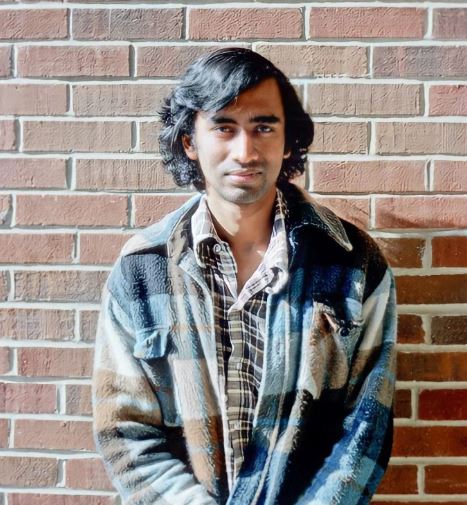
Dr Ramakrishnan in early days of his life
Rising above the odds
After he finished his post-doctoral research fellowship at Yale University in the 1970s, Ramakrishnan decided to apply for teaching jobs. He reached out to over 50 institutions in the US, receiving only a line of rejections for his efforts. The Nobel laureate says, “I was actually lucky in the end to (at least) get a job at the National Lab (Brookhaven National Laboratory).”
In his own words, his ‘background was slightly weird’ because after he got his PhD in Physics, he transitioned from Physics to Biology. It meant starting over, spending the next two years studying Biology as a graduate student at the University of California, applying a ‘weird technique of neutrons scattering to solve a biological problem’. “So, they just sent my application to pile B,” he remarked.
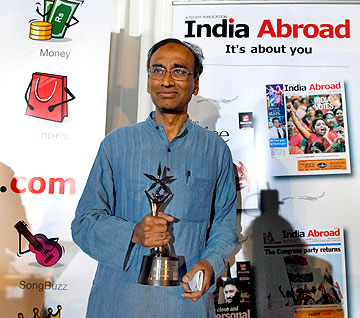
As far as getting a job in the four-year degree colleges were concerned, Ramakrishnan said, “they probably thought, ‘look at this guy’s long name, he is from India, we don’t even know whether he can speak English. How do we know whether he would even be able to teach and he has this slightly weird background, and so I went into pile B for them too.”
Changing tracks
Finally, when he landed a job as a staff scientist at Brookhaven National Laboratory, in Upton, Suffolk County, New York, he was delighted. He worked there for twelve years and got the opportunity to continue with his study on ribosomes. It was a new area of research then.

Cover of Dr Ramakrishnan’s book on ribosome
“I think I got into ribosomes somewhat by accident,” by reading about it in a journal and developing great interest in it, he remarked. The subject lay at the “crossroads of biology,” and Ramakrishnan felt it was a part of biology that required a knowledge of physics to be understood in totality. It was at this intersection, he believed, that he could add value to the ongoing research.
I was lucky to hit on a problem that had such a long lifetime and still be interesting. That doesn’t happen very often in science.
Ramakrishnan told about his research.
Moving to the United Kingdom
As he worked in the USA, Ramakrishnan learned that work on the macromolecular particle in ribosomes had been happening in Britain for a while. A breakthrough was coming, he knew, and he was determined to be part of it. After 24 years of stay, he bid goodbye to America, sacrificing a higher salary and a host of wonderful colleagues to start over in a new country. In 1999, he moved to the UK.
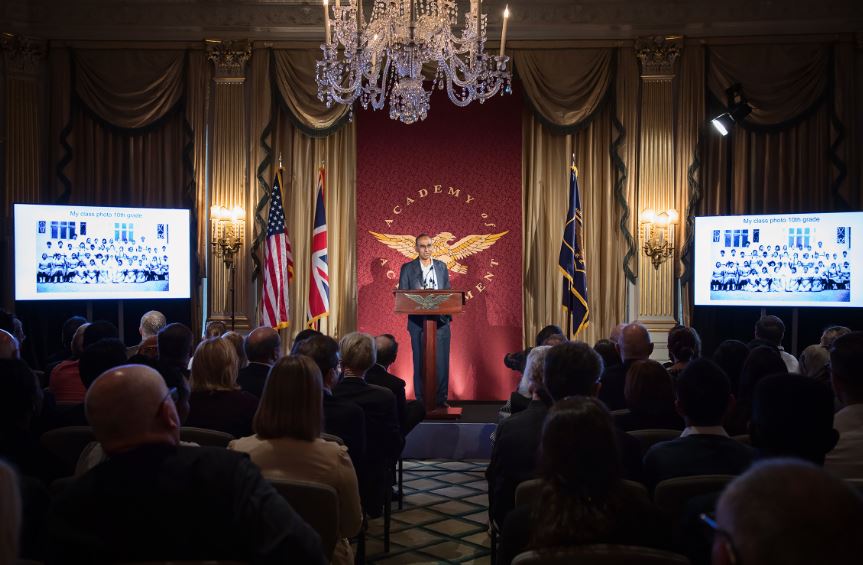
Dr Ramakrishnan addresses summit delegates in Mayfair, London in 2017 | Photo Credit: Academy of Achievement
Ramakrishnan joined the Medical Research Council (MRC) Laboratory of Molecular Biology at the Cambridge Biomedical Campus in UK, where the focus was on employing diverse methods in biology, physics and chemistry to understand biological processes at molecular levels and find long-term solutions to global problems. The laboratory had also churned out a number of Nobel laureates over the years. “The salary was much less but there was a lot more freedom and stability in terms of what I wanted to do,” Ramakrishnan remarked.
Life choices
The decision to move from the US to the UK, sacrificing some tangible and intangible benefits, proved to be a good one. Ramakrishnan and his team were able to reach a breakthrough in the study of ribosomes, as he had hoped. By uncovering its complex structure, they were able to solve many problems.
Winning the Nobel prize was the cherry on the cake. “For an academician in UK, winning a cash prize is quite a big deal.” He was able to make some of his dreams come true with the amount that he received.
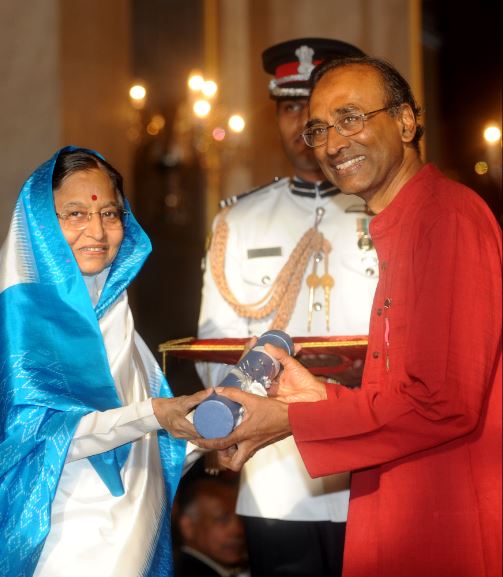
Dr Ramakrishnan receiving Padma Vibhushan from former President, Pratibha Patil in 2010
The scientist, who holds dual citizenship with Britain and America, has won numerous recognitions and accolades in his eventful career. In 2002, he also began making frequent trips to his homeland – India. Every year, the Global Indian spends a few months giving lectures at the Indian Institute of Science in Bangalore.
Ramakrishnan married art student Vera Rosenberry when he was just 23, and the couple have remained together since. She is a children’s book author now with 30 books to her credit. The couple live in the village of Grantchester near Cambridge, enjoying their 47-year-strong marriage.
Awards and honours conferred to Dr Venkatraman Ramakrishnan:
- British Order of Merit, 2022
- Knight Bachelor, 2012
- Padma Vibhushan, 2010
- Nobel Prize in Chemistry, 2009
- Louis-Jeantet Prize for Medicine, 2007
Follow Dr Venkatraman Ramakrishnan on Instagram
Also Read: The Mathemagician: Field’s Medal winner Manjul Bhargava bridges tradition and modernity
